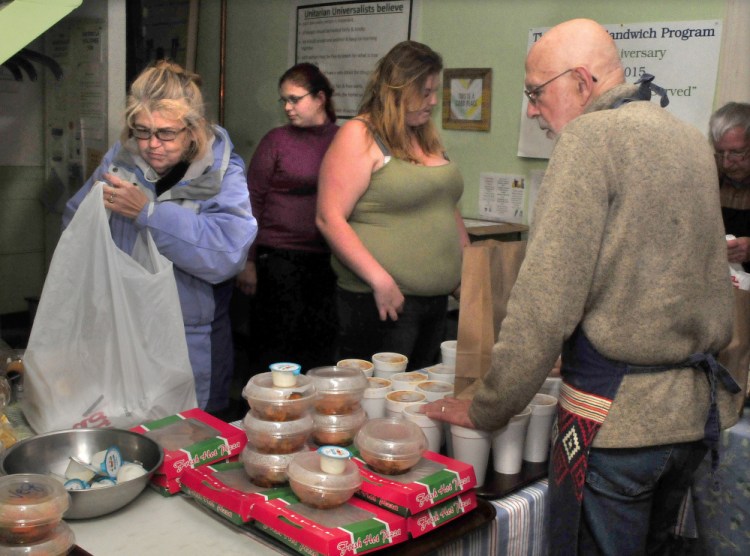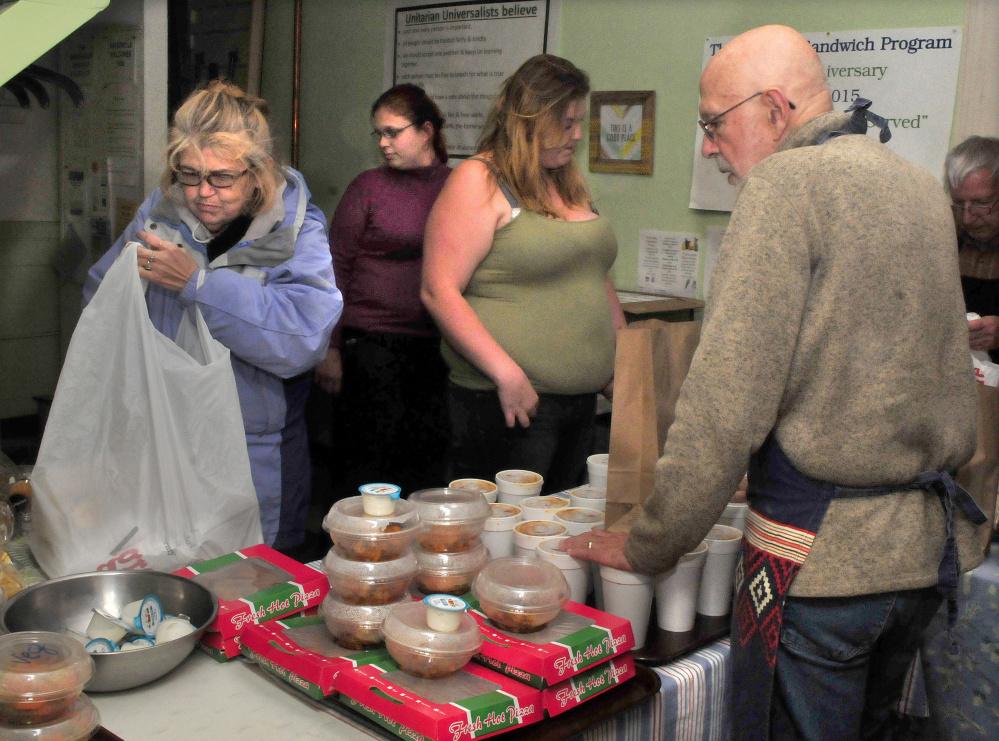WATERVILLE — Betty Palmer, executive director of the Mid-Maine Homeless Shelter, is darned glad to receive many pounds of leftover, freshly cooked food during the week from the Thayer Center for Health.
The food, cooked in the cafeteria but not sold or eaten, is packaged and collected by the homeless shelter on days designated just for the shelter. Every dollar in food that is donated to the shelter means officials there can spend money from their budget to help homeless people with employment and stable housing, Palmer said.
“It’s huge for us,” she said. “It gives us a healthy variety so people have lots of choices. It’s good partnering in the community. It feels like it gets us closer to food justice in our community when we’re not wasting food. Part of food justice isn’t just feeding people – it’s feeding people healthy food.”
The shelter and other organizations in the community are benefiting from a new program, the Food Recovery Program, that began last month when MaineGeneral Medical Center’s Thayer Center for Health contributed 375 pounds of food not purchased at the cafeteria to the shelter on Colby Street, as well as to the Evening Sandwich Program in the basement of the Universalist Unitarian Church on Silver Street.
The food otherwise would be thrown out, according to Shelley Goraj, director of MaineGeneral’s Food & Nutrition Services.
Goraj said organizations have certain days of the week when they come and collect the food, which includes cooked entrées such as chicken and meat dishes, green beans and other vegetables, and soups. Fruit also is donated.
Food that cannot be re-served at the cafeteria is taken from a steam table and bagged up, tested for temperature, cooled down, tested again for temperature and donated.
“It’s been working out pretty well. In fact, we repurposed 375 pounds of food during the month of October,” Goraj said. “That’s food that would have gone in the trash.”
The food program idea sprouted at a meeting on food insecurity in Maine held in September. In a question-and-answer session, Goraj said she had a lot of food to give to people in need and that all she needed was for someone to come and get it.
Kelly LaCasse of Healthy Northern Kennebec picked up on Goraj’s statement right away. She piped up and said she could connect Goraj with people who needed the food.
LaCasse is Healthy Northern Kennebec’s community food equity coordinator and Central Maine farm to school coordinator. She also serves on the Maine Food Strategy Steering Committee.
“We talked about types of food – leftovers from the cafeteria that did not sell that day that can’t be repurposed the next day, that can’t be heated too many times,” Goraj said.
The staff worked out a process for packaging the food and scheduling who picked up what food and when on a rotating schedule. The cafeteria cooks only breakfast and lunch, and lunch sales stop at 1:30 p.m., so those collecting the food arrive after 2:30, according to Goraj.
Now, Goraj is looking for organizations that could use leftover food from the Alfond Center for Health in Augusta.
“I’m looking for a partner in the Augusta area to do that because that’s where the majority of our food is,” Goraj said.
MaineGeneral spokeswoman Joy McKenna said there is a lot of excitement around the food program, and MaineGeneral, which works with the Good Shepherd Food Bank, is working with other partners on areas of food insecurity.
There is a lot of energy and focus on the issue in the greater Waterville area right now, she said.
“We are really proud of being part of an identified issue of need in our community and hope that we can grow this program,” McKenna said.
Copy the Story Link
Send questions/comments to the editors.




Success. Please wait for the page to reload. If the page does not reload within 5 seconds, please refresh the page.
Enter your email and password to access comments.
Hi, to comment on stories you must . This profile is in addition to your subscription and website login.
Already have a commenting profile? .
Invalid username/password.
Please check your email to confirm and complete your registration.
Only subscribers are eligible to post comments. Please subscribe or login first for digital access. Here’s why.
Use the form below to reset your password. When you've submitted your account email, we will send an email with a reset code.